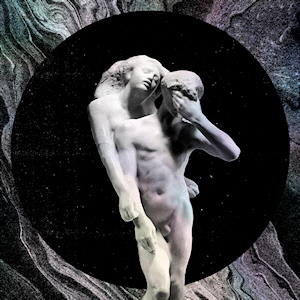
It’s here. After a beautifully executed marketing campaign highlighted by street art veve drawings and fictional bands, Arcade Fire’s fourth studio album, Reflektor, has arrived to bring music to our waiting ears. At a personal level, this record has struck a vibrant chord with me. The simplistic epic that was “Wake Up” from Arcade Fire’s debut, Funeral, was one of the first songs that opened up my musical horizons past classic rock, where I had always thought that the guitar solo was king. I’m finding my tastes diverging now into more like that of a dance-maven, and so a danceable album from the band that was a real catalyst in getting me to originally expand my musical horizons might just be my favorite release of the year when it’s all said and done.
As I alluded to earlier, this is a highly danceable album. If you loved “Sprawl II: Mountains Beyond Mountains” from Suburbs, you’ll love a lot of what is going on in Reflektor, even if it’s not a perfect imitation. With the expert hand of James Murphy (of LCD Soundsystem fame) producing, the album is full of a dark disco sound intertwined with Haitian raga influences. While Murphy is a savant with dark disco and complicated percussion, he does not overpower the performers in his production; while there are songs that sound like they could fit seamlessly on an LCD Soundsystem record, there are also ones that would feel better at home alongside a Vampire Weekend or Talking Heads release, if not an earlier Arcade Fire album. In particular, I felt that “Joan of Arc” would have fit seamlessly into Funeral. While there is much new ground being undertaken, the album is never not Win Butler and company at its essence.
Reflektor starts with a track of the same name, featuring vocals from the great David Bowie. This, the first single from the album, is one of the obvious highlights. At just over seven and a half minutes in length, it never feels like length for the sake of length. A largely vocally dominated piece to start with wonderful harmonies between Butler and wife Régine Chassagne, the instrumental builds slowly, layering both synth sounds and live instruments (keep an ear open for the bass saxophone), until the wonderful bridge hits with a danceable high.
Another standout track is “Here Comes the Night Time,” starting with a frenzy before a sudden ritenuto to a laid back dub punctuated by a very Murphy-esque bassline in contrast with a piano line that has a feel to it somewhere in between calypso and Vampire Weekend’s recent album, Modern Vampires of The City. To close, the track quickly accelerates to that original tempo for a bridge section that I wish would’ve been extended longer because of the great contrast it provides, before finally ending at the dub tempo.
However, I found the album’s tour de force to be “It’s Never Over (Oh Orpheus).” While it is, within the context of the album, the companion song to the preceding “Awful Sound (Oh Eurydice)” I find it to be outstanding on its own. A lot of that comes back to my love for classic rock; I’m a sucker for a good guitar lick at heart, and this song has a great one; it’s driving, funky, and perfectly framed by the rest of the arrangement to allow it to really shine. It is an example of outstanding songwriting.
If I had a bone to pick with this album, it would be the lack of lead vocals for Chassagne; while she provides beyond outstanding harmonies and interjections in French, when I heard that James Murphy was producing this album I immediately thought of how great her voice was on “Sprawl II,” a track with many dance elements to it. While I’m in no way disappointed with the end product, the amount that I love that song combined with not finding a spiritual descendant of it on Reflektor left me feeling that it could, in the midst of its greatness, somehow be better. That’s untapped potential that I want to hear, and I hope that Arcade Fire investigates more thoroughly in the future.
From top to bottom, the album is outstanding as a whole product. While I have mentioned songs that I found to be outstanding in their own right, there is not a song that sounds out of place in the context of the whole album. That is especially amazing in that this release is a double album, where each disc has somewhat of its own feel to it. To achieve something that feels whole either as its whole or as its halves is nothing short of remarkable. While I definitely would have loved more Chassagne vocals, Arcade Fire truly nailed it with this one, continuing to expand their sound without losing the style that is so distinctively theirs and I can’t fault them for a stylistic choice that resulted in pure beauty. It’s not perfect, but it’s very close, and since our rating system doesn’t have anything between 4.5 and 5 on the 5 point scale, I’m skewing toward that 5 because it’s that good.